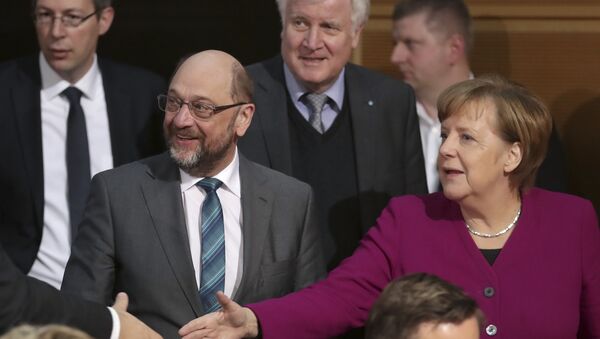As the vice chairman of the right-wing faction in Bundestag assured, they would continue the same policies on migration, euro crisis management and tax rates.
On February 7, German Chancellor Angela Merkel announced that her CDU/CSU alliance finally completed the negotiations on forming a coalition government with the SPD. The parties agreed on a draft coalition deal, which has been approved by CSU and is due to be voted on by the congresses of the CDU and SPD.
READ MORE: Merkel Tries to Allay Conservative Fear of 'SPD Agenda' in New Coalition
Draft Coalition Agreement Will Not Solve Main Problems
The previous German government was also formed by the so-called grand coalition comprising the CDU/CSU and SPD, following the federal election of 2013. During the Merkel-led coalition's last term, its "open-door policy" for migrants prompted criticism from those claiming that the security situation in the country had worsened due to the inflow of migrants. For example, the AfD has been promoting a cap on all immigration and the closure of the German borders.
READ MORE: She's a Lady: Who May Become Next SPD Leader After Schulz
The coalition was also criticized for lack of tax reform, with German rates being the second highest to Belgium when it comes to developed countries worldwide. The AfD has been calling for cut taxes for low- and medium-income workers, while the new coalition deal presupposes tax relief for the poorest eastern states only. The coalition has also faced criticism from costly clean-power subsidies and providing a major share of support for struggling eurozone countries.
Dr. Hartwig noted that the coalition agreement does not sufficiently address all the aforementioned issues.
"The agreement reached among CDU, CSU and SPD does not even try to give perspectives or to offer solutions to the most important challenges Germany is confronted with today: illegal immigration, lack of border control, Euro crisis, ongoing transfer of foreign debts into Germany, exploding charges for renewable energy, one of the highest tax rates in Europe, debt reduction in Germany etc. Instead, it offers some financial benefits to some parts of the population to the detriment of others. … It has become crystal clear that CDU, CSU and SPD have not learned anything from the severe mistakes they made in the past 4 years," Hartwig said.
READ MORE: 'Little Respect': German FM Slams Successor for Failing to Keep His Word
Gerold Otten, a member of the German Bundestag's defense committee from the AfD party, shared a similar point of view, saying that he did not expect the new government to change policies.
"The coalition government will not bring about the major policy changes, which Germany needs so desperately," Otten said.
Ministerial Portfolios Distribution
According to the draft agreement, the SPD received ministerial portfolios in the Foreign, Finance, Justice, Labor and Environment Ministries, as well as of the Ministry for Family Affairs. The party will also nominate the vice chancellor.
The CDU has obtained five ministerial portfolios, including the Ministry of Economic Affairs and Energy, as well as the Defense Ministry. The CSU will meanwhile nominate the heads of the Economy Ministry and the Transport Ministry, with Horst Seehofer, the CSU leader and minister-president of Bavaria, expected to become the minister of internal affairs.
Dr. Hartwig noted that the fact the SPD got three major portfolios — finance, foreign affairs and labor — while Merkel's CDU gave up key positions was an alarming sign that the chancellor was willing to do anything to stay in power.
READ MORE: Europe Goes Right-Wing While Demoralized by Unstoppable Immigration — Analysts
"The distribution of the ministerial portfolios is a clear indicator that Mrs. Merkel 'has bought' the social democrats in order to maintain her power. To put the Ministry of Finance into the hands of social democrats makes clear that there is no commitment or even willingness to lower the huge debt load on Germany — to the contrary. Mrs. Merkel is about to sell the remaining content and values of CDU and CDU to the detriment of the country," Dr. Hartwig said.
Otten also expressed concern about the SPD having influential ministerial portfolios.
READ MORE: German Coalition Gov't Deal to Speed Up 'Downfall' of CDU/CSU, SPD Parties — AfD
"The prospect of both, the ministry of foreign affairs plus the ministry of finance being entrusted to social democrats foretells a bleak future, in particular with regard to our country’s sovereignty," the lawmaker said.
Summarizing the coalition deal, Otten said he felt that the new government would not last the whole term.
"In general, there are far too many contradictions within this enforced coalition, as to allow it to last for an entire election period," Otten concluded.
READ MORE: 'I Will Fight for EU Renewal as Foreign Minister' — Germany's Schulz
The new government has been in the making since September. The CDU/CSU first attempted to form a coalition with the Greens and the Free Democratic Party, but the preliminary talks with those parties fell through. The alliance was then left with several options, including the formation of a minority government on its own, holding a new election or negotiating with the SPD, which initially ruled out a coalition with the CDU/CSU.
Following the formation of the coalition government, Angela Merkel will assume the office of chancellor for her fourth term.
The views and opinions expressed by the Afd members and do not necessarily reflect those of Sputnik.

